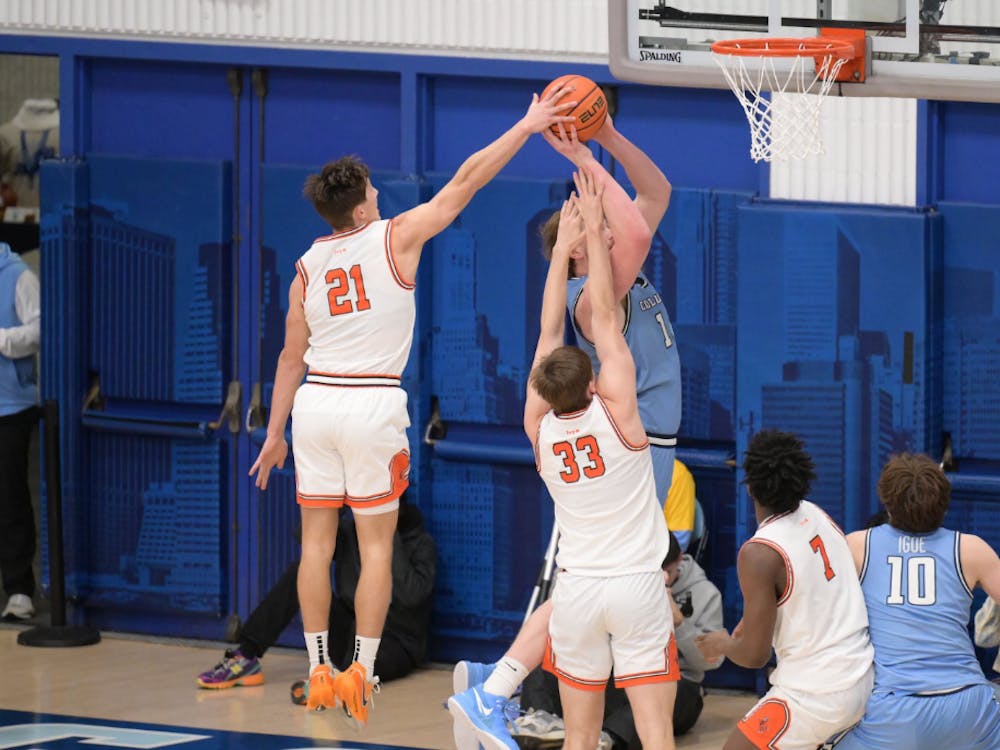We all know the scene. Your lab screams down the road after your neighbor's Grand Cherokee, bites down on the spinning tire. And, using the tremendous strength in his neck, lifts the car and contents into the air before slamming them to the hard concrete. Leaving the smoking wreckage behind, he trots back happily, having again defended your home from certain peril.
Or not. We've all asked the question, "What does he think he's going to do?" The answer is easy. He doesn't think. He's a dog, and what he has is enthusiasm, what he lacks is forethought.
This past weekend, Princeton football showed signs of life in a season that seemed doomed one week earlier. The above example serves to explain the sudden improvement. The Tigers tempered their overwhelming enthusiasm with intelligent and reserved play.
It is understandable that Princeton would be overeager in its first few games. The Tigers want to bring good results to their new head coach, and they want them quickly. During training camp, most players commented on the renewed energy the program carried into this season. In their first game against Lafayette, however, this energy consumed the Tigers, resulting in sloppy, reckless play.
Princeton racked up nine penalties for 88 yards against the Leopards, most of which came from a defensive unit frustrated by Lafayette's effective passing game. On offense, junior quarterback Tommy Crenshaw was often wild, overthrowing receivers or forcing passes to covered receivers.
"I think there was a combination of [jitters and overanxious players]," offensive coordinator Dave Rackovan said after the Lafayette game. "I think our kids were ready to play from a mental standpoint. They went out and they played hard. Playing hard doesn't necessarily mean you play well, particularly on offense.
"On offense you have to be focused. If you have too much of a high energy level, and not enough focusing in on execution and assignment, it can hurt you."
Even a week of experience can make a big difference, and Princeton looked much more comfortable Saturday night. Despite a trying start, the Tigers held their composure throughout a tense game. There were many signs of this new assurance. Most importantly, the Tigers never wavered in their commitment to run the football — a difficult task when lured by the mirage of quick touchdowns through the air. During its worst moments of the Lafayette contest, Princeton relied almost exclusively on the pass to hurry itself into the lead.

Against Lehigh, however, senior tailback Kyle Brandt was an ever-present part of the Tiger attack. Running into a very strong Lehigh front line, Brandt carried the ball 26 times, more than doubling his output from the previous week. The senior's consistent — if not flashy — rushing ate up time on the clock, giving Princeton nearly a five-minute edge in time of possession.
Poise
Princeton's patience in the Lehigh game showed in its scoring, as well. Rather than making panicked attempts for the end zone when the Mountain Hawks took control early, the Tigers quietly held themselves in the game by settling for four field goals. In addition, Princeton incurred 49 fewer yards in penalties against Lehigh than against Lafayette.
Although so many facets of Princeton's game improved against Lehigh, the team must still mature further. Crenshaw threw a crucial interception at the end of the first half that eventually resulted in Lehigh's second touchdown. The score going into halftime changed from an acceptable 13-9 to a precarious 20-9.
Head coach Roger Hughes asked the quarterback the question that was on many fans' minds after that play.

"I said, 'What were you thinking there?' " Hughes said. "He said, 'Coach, I was just trying to throw the ball away and as I was going down, I released it and I didn't get enough velocity on the ball.' "
Crenshaw's answer is a sign of hope for the weeks to come. He was thinking.







